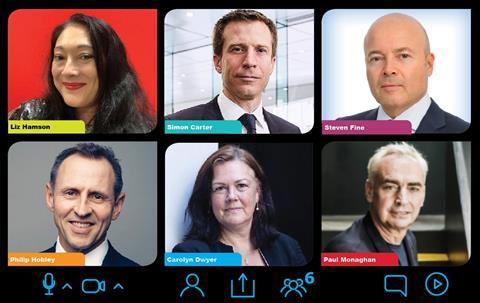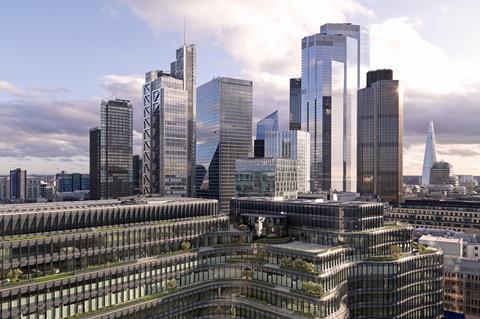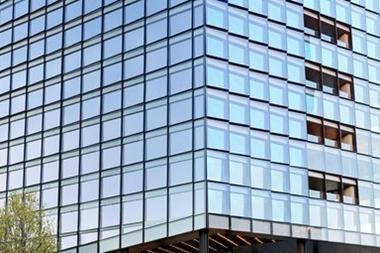The Covid-19 pandemic has sparked an existential crisis in the office sector, with much of the UK workforce being forced to work from home indefinitely. Yet while uncertainty still looms large, the arrival of a vaccine has given the industry hope of a recovery next year.
Panel of experts
- Simon Carter, Chief executive, British Land
- Carolyn Dwyer, Director of the built environment, City of London Corporation
- Steven Fine, Chief executive, Peel Hunt
- Philip Hobley, Partner and co-chair, London offices, Knight Frank
- Paul Monaghan, Founding director, Allford Hall Monaghan Morris
- Liz Hamson, Editor, Property Week

Property Week teamed up with British Land and some of the sector’s leading voices in a roundtable discussion about what lies ahead in 2021 and beyond, looking at the changes and challenges, as well as the practical solutions needed for the coming years.
Liz Hamson: What has homeworking been like for you and what impact has it had on your workforce?
Simon Carter: Mixed is the word I’d use. The initial phase was better than we thought it would be, as the technology worked. We were in crisis response mode and things were very task based. But as things dragged on, it did get quite exhausting and I found it increasingly hard to divide my work life and home life. I found myself going back to the desk after dinner and then working later into the night. I think with this second lockdown, it would have been really tough going back to homeworking if it hadn’t been for the vaccine on the horizon.
Steven Fine: It worked well, with a massive focus on communication: making sure you talked to your colleagues and ensuring that you felt a part of what was going on. But as time dragged on, there were issues around the intensity of this process as well as the mental health implications and the wellness implications, notwithstanding the difficulties of assimilating new joiners into the firm’s culture.
Philip Hobley: I think the elixir and the joy of being back in the office with colleagues is something that you simply can’t replicate. That forced period apart created an appreciation of sitting in an environment next to a colleague. You realised what you had really been missing.
The elixir and the joy of being back in the office with colleagues is something you can’t replicate
Philip Hobley
Carolyn Dwyer: Generally our staff and workforce have been quite positive. They feel that the City [of London] has treated them really well. They appreciate the time and cost savings of working from home and the increased flexibility. There are some benefits that we really hope we can hang on to – for example, we’ve managed to go paperless. However, there have been incredible challenges, particularly for our younger members of the workforce, for our apprentices and for new people joining the organisation, because forming new relationships is very difficult with the national restrictions in place.
Paul Monaghan: I’d find myself working much later. In those lovely summer months there was a novelty to it but I think people really started to get a little bit worn out as time went on. The second lockdown has been completely different. With the worse weather and the darkness, I’ve noticed mental health issues that have really been accelerated this time.
LH: What will be the impact of the tiers system across Britain?
PM: Young staff quite enjoy coming into the office and then going out afterwards for a quick drink, so when we were first in tier 2, clearly all that went and also fewer people came in. Clerkenwell, where our office is, is dead. I feel sorry for the sandwich shops that closed and it looks like they are never going to open again, and the pubs and restaurants that must be in trouble.
But this vaccine on the horizon has had a big effect. I’ve noticed that there is an optimism with a lot of our clients. Quite a few projects went on hold or people became a bit more tentative, but I’ve noticed in the past few weeks that there have been a couple of projects that I know are definitely going ahead now.
This vaccine has had a big effect. I’ve noticed that there is an optimism with a lot of our clients
Paul Monaghan
CD: The vaccine looks really promising, but it is early days and the distribution of it is going to take a long time, so it’s not going to be an overnight cure. I can understand the need for the tiers but I think it is quite complicated. People travel into central London from all over the South East of England and further out, and they’re coming in from different tiers and being expected to behave in the way that their tier imposes. It’s all a bit confusing. We really need some clarity fairly quickly about how and when people can return to the office safely.
LH: When do you think we will return to some semblance of normality?
SC: Most of our customers are in a position where the offices are open, but they follow government guidance. The offices are open if people want to come in for essential tasks or for their wellbeing. People are coming in, including some of the youngsters, which is good to see. But I think that more people returning to the office will basically follow the roll out of the vaccine. The speed with which that happens will determine how quickly people return to the office in my mind.
SF: I’m not pessimistic at all. I think the self-generated momentum of the desire from staff to be back in the office is quite powerful. The government can regulate the workspace so we have to prepare an environment that’s safe for individuals to come back to. They can’t regulate the domestic home so easily. People are in general quite fed up and once they come in, they realise how much they miss that environment.
LH: What do you think the office of the future will look like?
SF: It is going to be about having far more collaborative open spaces where people can work and probably find a better way of interacting. People really miss the water cooler moments where you have just-by-chance conversations. I don’t like the idea of hot desking, but I do like the idea of flexibility. All Covid-19 has done is accelerate change rather than cause change. There will also be a big focus on sustainability and ESG. Making the office a great place to work is going to be a very key feature.
CD: Offices have been getting better and better and this will just increase the pace of that, because we’re not just dealing with the pandemic, we’re dealing with climate change, Brexit and inequality that’s really had a light shone on it during this pandemic. We need to make offices and city spaces really stimulating and safe and attractive, and people care more and more about their environmental credentials.
PH: When working from home you can be productive and efficient, so the office is being repurposed to do the bits that you can’t really do at home. It’s the collaboration, the coaching, the training, the culture and the bringing together of people. The office is definitely pivoting towards providing the spaces that you can only really have in the workplace, making them more dynamic and riper for innovation.
We’re not just dealing with the pandemic, but with climate change, Brexit and inequality
Carolyn Dwyer
PM: Now, if we’re going to get people to go back, there is an emphasis on the office having to be more attractive than ever. One thing I’ve seen over the past 20 years is that a lot of tech companies have grown incredibly quickly, but they weren’t interested in portraying an image of power and corporate nature, they were interested in looking after their staff.
I remember cycling around the City of London in lockdown and looking at all these buildings with big receptions and stone everywhere, and I thought “no, that is over”. That’s an expression of power and companies aren’t as interested in that now as they are in expressing something that attracts staff.
SC: People initially focused on working from home and thinking that would be negative for office demand, but it’s a really complex picture. What we’ve established is that the office is about collaboration, so people will likely choose to come in on similar days. There will be a reduction in densities. We increased densities dramatically in London over the past 10 years and that is definitely pausing and I think will go into reverse.

With our scheme at Canada Water, the theme that is really important is wellbeing.
That was our vision before the pandemic and it has become even stronger. We are delivering lots of public realm and I think parks will be important. Sustainability is also key to occupiers and all of our occupiers have net-zero carbon targets, so if we can help them deliver those, that’s great.
LH: How do you think climate concerns need to be addressed in the new-look office?
CD: They need to be addressed in both offices and the public spaces around them. It has to be a whole ecosystem. We have to move towards renewables. In the City we’ve made a lot of effort to change the way the streets are laid out to ensure that people feel really safe and want to come back to enjoy those spaces.
LH: What impact has Covid-19 had on demand within the office market?
PH: The past two quarters have been incredibly muted. They have been two quarters of record lows, which is understandable because of lockdown. It is very difficult to commit to office space if you can’t go to the building to see it and feel it, because it is a very physical thing.
But there have been some transactions, which shows how important the office is for companies in delivering their purpose. Where those deals have been happening is in the sectors that are more counter-cyclical – the tech titans have carried on transacting.
We increased office densities dramatically in London over the past 10 years. I think that will go into reverse
Simon Carter
There has also been a pause in the development pipeline as people take stock. We didn’t know how deep the pandemic was going to cut into the wider economy, but there is a groundswell of confidence around the new vaccine next year. We’ll see less [space] delivered than was planned, but intelligent developers are using this pause to look ahead to the post-pandemic world and making sure schemes are fit for purpose and that they meet the criteria occupiers are focusing on.
SC: One observation I would make is that the lettings we’ve done at Broadgate are pretty broad. We have financial services firms, but also tech businesses and media companies.
I still expect demand to be broad-based and recent leasing suggests that. Tech will remain strong – even if those firms have more homeworking, their growth is so strong that it will continue to be important to London. Life sciences and health tech will also be growth areas as beneficiaries of Covid-19.
CD: I’m pleased to say we have got a really strong development pipeline – we have got more major planning applications coming through the system than we have had for a long time. We have approved major schemes during lockdown and there are many more on the way. It does demonstrate the degree of confidence in London. We think central London will very much remain a hub for the global banking and financial services sector.
LH: Where do you think we will be in five years’ time and what one thing would you like to see happen now to ensure a vibrant future for the office sector?
SF: A new phrase is being coined: instead of ‘software as a service’, it is ‘space as service’, and I think that will be a key feature in the years ahead, where the office environment has that hotel-type feel where you have additional services landlords can charge accordingly for. Selling the lease is not the end of the game for the landlord, it is the beginning, because they have still got to provide those services so that the space becomes a destination.
CD: The single thing I’d really like to see changed is that we really embed inclusivity into our new offices. The disparity of Covid-19 has shown us that various communities have been adversely impacted and it doesn’t really matter which crisis you’re looking at.
PH: We’ll see a closer alignment between landlords and occupiers as customers. Real estate can really help occupiers make significant moves towards their ESG goals. Change can be a really good thing – it creates opportunities and tends to lead to innovation. My hope is that there is a new wave of innovation that comes through and that developers are brave in embracing it.
I wouldn’t be surprised if we get to reasonably high levels of occupancy certainly by the end of Q1
Steven Fine
SC: The one area I hope we see more of is great design and architecture. The crisis has shown us that we need buildings that really lift us up and help with innovation and collaboration. Another thing I would like for Christmas is the successful roll out of the vaccine in 2021.
SF: Our snapshot would be no different to anyone else’s. It is about overcoming the anxieties and the concerns of Covid-19. Don’t underestimate the power of peer pressure, as people come in and tell their colleagues that it is okay to come in. That has an enormous multiplier effect. I wouldn’t be surprised if we get to reasonably high levels of occupancy certainly by the end of Q1, subject to government restrictions.
LH: What are clients looking for and is that likely to change going forward?
PH: Occupiers are looking for an environment within and without a building that will be intrinsically attractive to their staff. An environment where staff can be productive.
LH: Which factor will become most significant in the post-Covid-19 market: technology or the more human side of placemaking?
SC: We have an app that we refer to as digital placemaking, so we think of the two as being really closely related. I think the app will become more important in the longer run. It has gone down pretty well and you will see the increasing importance of digital technology to get in and out of buildings and to control buildings, but there is also no substitute for public realm.





























No comments yet